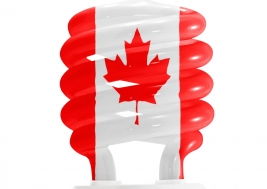
Every time I’ve tested products, services or brands in focus groups in recent years, participants have stressed the importance of local products*.
In qualitative research, local companies, brands or products are often preferred over others, and the reasons for gravitating towards these are legion…
- Higher quality perception: For example, fruits and vegetables are considered fresher; and Canadian regulations for several types of products (e.g. meats, electronics) are considered stricter than those in our neighbouring countries;
- Stimulating the local economy or supporting local producers and artists;
- National or regional pride;
- For some types of products – clothes, for example – consumers will argue that Canada offers better working conditions to labourers, which they want to support;
- Other consumers get their green on, arguing that local products are more environmentally friendly, since they travel smaller distances;
- A sense of uniqueness: For example, locally-made clothing is usually created on a much smaller scale than mass-produced items;
- Local manufacturers are claimed to be more aware of local needs: Just think of anything that needs to resist our harsh Canadian winters.
It’s very interesting to hear the arguments for local products flow abundantly, but do consumers put their money where their mouth is?
Even though I’m convinced that in certain categories, “local” constitutes a true advantage over competitors, I still can’t shake the impression that a lot of the excitement is simply social desirability.
Or even more than that… has “buying local” become a new status symbol?
Apart from helping to save the planet, buying local also implies having the means to afford these products, since they are usually more expensive. In addition, being aware of the economic impact and health benefits of local products could be seen as an indication of higher education, or at least of being well informed.
The problem is that, unlike luxury cars, it’s often hard to show off locally-made products to your entourage – unless of course you want to bring your organically grown cauliflower to your after-work parties…
If buying local is indeed a status symbol, then in order for it to be worth the premium price, consumers have to have something to show for, literally. So if you’re offering a local product, service or brand, don’t just rely on the “local” benefits, but ensure that consumers can be recognized by their surroundings for purchasing it. If so, more consumers might be willing to spend the extra dime.
- What’s considered “local” is surely up for debate, but depending on the type of product, it seems to range anywhere from made in the same city, to regional production, or even simply “made-in-Canada”.

